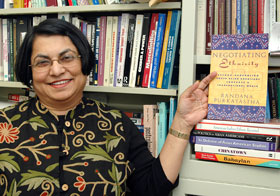  |
| HOME | THIS ISSUE | CALENDAR | GRANTS | BACK ISSUES | < BACK | NEXT > |
Sociologist’s book explores ethnic identity of South Asian Americansby Karen Singer - December 5, 2005 |
||||
|
Watching her daughter grow up in suburban America and wondering about other second-generation South Asian Americans in similar situations, Bandana Purkayastha discovered what appeared to be a research gap in her field. In the process, she found that communications technologies and the global marketplace are playing a growing role in shaping ethnic identity. “People still study groups by nationality, thinking if immigrants learn English, get high-paying jobs, and go into the mainstream there’s nothing more to tell,” says Purkayastha, an associate professor of sociology. “Nobody is talking about the children of highly- educated, relatively affluent non-white immigrants.” A grant from the Research Foundation enabled Purkayastha to tell a more fascinatingly complex story in her book, Negotiating Ethnicity: South Asian Americans in a Transnational World, published in May by Rutgers University Press. Based on in-depth interviews with 48 South Asian children of middle-class parents from India, Pakistan, Bangladesh, and Nepal, the book explores how these individuals perceive, and sometimes bolster, their ethnic identity. Most were born in the United States or arrived when they were one or two years old. “I was primarily looking at the issue of having middle-class parents and growing up in the suburbs,” Purkayastha says. “These young people went to fairly excellent schools, mostly public … and all were either in college or had graduated or started working. “All appeared to be fairly well assimilated and, on the surface, they’re all mainstream,” she adds. Yet when Purkayastha asked her subjects to describe themselves, “every single one chose a hyphenated identity,” saying they were an American of Indian or other South Asian origin. “This book delves into why are they choosing these labels,” she says. She found that while growing up, these children never felt totally accepted as American because they looked different and were perceived as coming from a different culture. “They would tell me things like ‘if we talked about arranged marriages in school, people would expect me to know everything about it’,” Purkayastha says.
These early experiences of “racialization” were amplified because of extended family links in other countries. When the children traveled, “their Americanism” was even more apparent to them. They also found themselves increasingly targeted by global marketers pitching clothing, music, and other “multi-ethnic” consumer goods. Buffeted by conflicting perceptions of ethnic identity, some of the children found solace in college sharing experiences with other South Asians, and actively seeking ways to express their ethnicity. One chapter examines the growth of student-organized dance competitions, seminars, and other activities aimed at fostering South Asian ethnicity. “About a third were pretty politicized, organized on the basis of their ethnic identity, and wanted to claim their space in U.S. history,” says Purkayastha. The sociologist is now seeking additional funding to delve deeper into the subject. “The next generation of questions will focus on how much meaning does religion have to them, and how are they using it to organize,” says Purkayastha. She will also study how the Internet is being used for this organizing. Purkayastha believes her research so far strongly indicates that ethnicity is no longer influenced only by what happens in a single nation state, or family. “There are other players in the process, including the marketplace,” she says, “and the scope of how to construct ethnic identities has been expanded significantly because of all kinds of communication technologies. “The net result is that what we mean by becoming an American has to be rethought in a global framework, rather than just within the geographical boundaries of America,” adds Purkayastha. “This is an emerging disciplinary area.” |
| ADVANCE HOME UCONN HOME |

